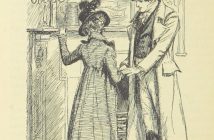Ever since the news broke that the Great British Bake Off was leaving the BBC for a move to Channel 4, phrases such as ‘quintessentially British’ and ‘quintessentially BBC’ have been thrown around left, right and centre. But what do these phrases really mean? Why is the Bake Off so close to our British hearts?
Bake Off and the BBC seem like two halves of a whole to us dedicated fans that have watched the show as it has been nurtured into the Bake Off we know and love today. To see Bake Off leave the BBC seems like the worst thing that could happen to this nationwide-loved programme.
Both the BBC and Bake Off are considered typically middle-class and typically English, so they are natural partners for the journey we have seen Bake Off take. The show has a homemade and quaint atmosphere surrounding it; something which the BBC embraces and displays beautifully. The so-called WI (Women’s Institute) inspired competition, set in a beautiful marquee in the stunning grounds of a stately home, simply radiates Britishness. Its consistently high viewing figures demonstrate quite clearly that the layout, style and values of the show are exactly what the British public love to see.
Helping to emphasise this British feeling enveloping all its fans are, of course, the judges and presenters. The devastating news that Mel Giedroyc and Sue Perkins won’t be following the show to Channel 4 simply serves to emphasise to viewers that the show truly belongs on the BBC, that it is ‘quintessentially BBC’. They seem to embody the values that we love to see. Their cheerful attitude in the face of a baking disaster, their willingness to help and rally together panicking bakers, and their quirky humour are all parts of the vital ingredients needed to help Bake Off thrive.
As well as Mel and Sue, Paul Hollywood and Mary Berry are also part of the glue that holds Bake Off together. Paul’s withering stare and momentous congratulatory handshakes keep the public constantly on the edge of their feet. Mary herself is loved by all unconditionally. She is described as a ‘talented, homely chef with no gimmicks‘. This precisely is why we love her so much; her unwillingness to deeply offend anyone, and her kindly attitude make the show what it is.
One of the biggest worries is that the way Channel 4 works will mean that Bake Off cannot function the way it does now. Adverts, product placement and gimmicky rounds or celebrity appearances are all feared to either be introduced eventually or dramatically change Bake Off as we know it. The public are questioning whether the Bake Off will be made longer in order to accommodate adverts, or whether it will be rushed and strictly structured with lots of cliffhangers. These changes would mean that either way Channel 4 cannot replicate Bake Off as we know it from the BBC, and so the typically British Bake Off that we know and love looks to change when it airs in 2018. Although Channel 4 seems to be typically known for its new and exciting feature programmes, ground-breaking documentaries and reality programmes; the fear is that Bake Off does not fit in with the average Channel 4 show.
Separating Bake Off from the BBC seems utterly bewildering. Bake Off embodies the BBC’s ideals of homespun, typically British origins, and the structure and layout of the show has appealed across the country to people of all ages. It unites us in our love for food, our ability to connect to the bakers and our curiosity and amazement at the food that they create. Whether Bake Off is able to make it through the challenges that a move to Channel 4 may throw at it remains, to be seen.




